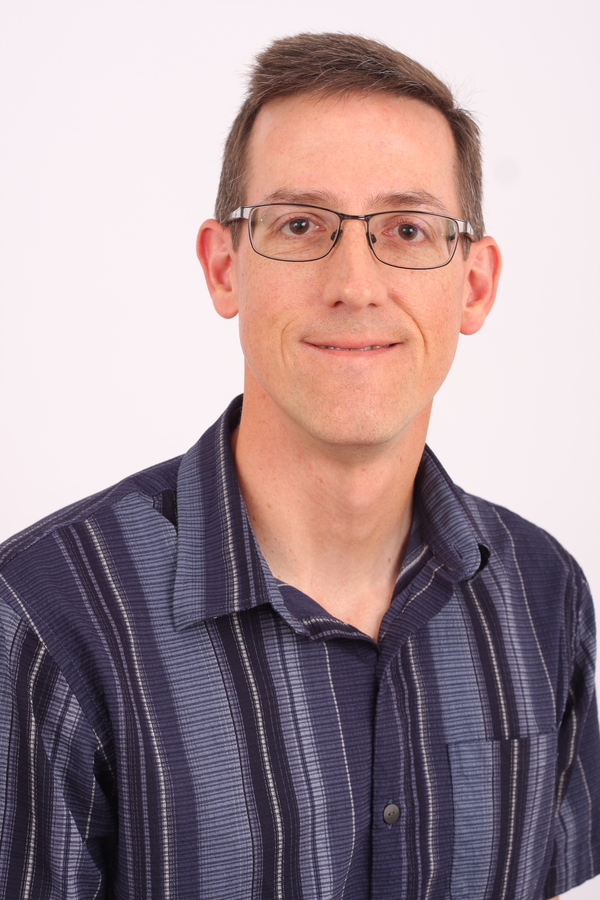David Thompson

About
As an undergraduate I majored in Spanish at a liberal arts college and quickly determined that I wanted to teach at a similar school. I’ve been teaching language, culture, and Paideia at Luther since 2004 and enjoy my work in the Luther community very much. One of the best parts of my job is leading January-Term study abroad courses to Spain and Latin America, where my students immerse themselves in the local culture and build their proficiency in Spanish.
I have researched and published on contemporary Spanish poetry by women writers and more recently on metacognition in language courses — how students become aware of and monitor their own learning. I’ve collaborated with Luther students to build digital resources for learning Spanish and recently completed a series of problem-based learning units for advanced students of Spanish.
From August 2018 – May 2020 I served as Dennis M. Jones Distinguished Teaching Professor in the Humanities and directed a project to promote inclusive teaching and learning at Luther.
SPAN 101: Elementary Spanish I
Introduction to effective communication in Spanish, including speaking, listening, reading, writing and intercultural skills.
SPAN 201: Intermediate Spanish
This course is for students who have successfully completed at least one year of college-level Spanish or the equivalent.
SPAN 303: Written Expression
This is a course for students who have completed intermediate-level coursework in Spanish and who have a solid background in Spanish grammar. Focus on developing skills in writing and reading comprehension in a variety of cultural contexts. The course culminates in a research project.
SPAN 340: Language and Culture in the Spanish-Speaking World
This January Term study abroad course will introduce students to the culture of a Spanish-speaking country first-hand. Course locations may include Perú, Dominican Republic, Spain, Ecuador, Mexico, Argentina and other countries where Spanish is an official language. In addition to language and culture instruction at a local institution, students will live with host families and participate in guided visits to sites that illustrate the diverse cultural history of the country. This course satisfies the immersion requirement for the Spanish minor. All interested students must complete an interview with the instructor prior to enrollment. May be repeated for credit up to three times in three different locations.
Paideia 111, 112: Enduring Questions
A two-semester common course for all first-year students that addresses questions central to the human condition. It develops students’ ability to read, write, analyze, discuss, and research by engaging with works from across the disciplines, drawn from different time periods and parts of the globe. As a signature course and a foundation for liberal learning, “Enduring Questions” is taught by faculty from all divisions of the college. Students may not withdraw from Paideia 111 or 112. If they fail the course, they must retake it in the next semester it is offered.
- Ph. D., Hispanic Languages and Literatures, Washington University, 2000
- M.A., Spanish, Washington University, 1996
- B.A., Spanish, Wabash College, 1995
My project as Dennis M. Jones Distinguished Teaching Professor in the Humanities (2018-2020) is titled “Speaking the Language of Inclusive Pedagogy.” Language study is a foundational requirement for all Luther students, because we believe that studying another language and its cultures is one of the best ways to see the world from different vantage points and to equip students for work and service in a changing society. In a similar fashion, studying and becoming more proficient in the language of inclusive pedagogy helps faculty see learning from different vantage points and equip themselves to teach students equitably. My aim is to encourage my faculty colleagues and me to raise our proficiency in the language of inclusive pedagogy in order to understand and respond well to the diverse learning needs of Luther students.
Luther College Resources
- Inclusive Pedagogy Faculty Toolkit
- Sheila Radford-Hill. “Practicing Inclusive Pedagogy.” Luther College Ideas & Creations Blog, 14 May 2014.
- David Thompson. “Three Ways I Plan to Build a More Inclusive Classroom from Day One.” Luther College Ideas & Creations Blog, 4 September 2019.
- Bibliography on Inclusive Teaching and Learning
Other Resources on Inclusive Pedagogy and Inclusive Excellence
- Diversity and Inclusion (Yale Center for Teaching and Learning)
- Classroom Climate: Creating a Supportive Classroom Environment (Eberly Center, Carnegie Mellon University)
- Overview of Inclusive Teaching at Michigan (University of Michigan)
- Inclusive Moves (Derek Bok Center for Teaching and Learning, Harvard University)
- Inclusive Pedagogy (The Teaching Commons, Georgetown University)
- Making Excellence Inclusive (Association of American Colleges & Universities)
- Accessible Syllabus (Anne-Marie Womack, Tulane University)
- Universal Design for Learning in Higher Education
- Resources on Racial Proficiency and Talking about Race in the Classroom
This January-term study abroad course (SPAN 340) introduces students to the culture of Spain first-hand. In addition to language and culture instruction at a local language institute, students live with host families and participate in guided visits to sites that illustrate the diverse cultural history of the country. This course satisfies the immersion requirement for the Spanish minor as well as the all-college Intercultural requirement. All interested students must complete an interview with the instructor prior to enrollment.